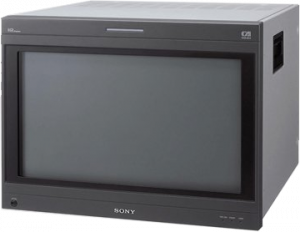CRT:BVM-A24E1WU: Difference between revisions
Jump to navigation
Jump to search
No edit summary |
mNo edit summary |
||
| Line 40: | Line 40: | ||
The BVM-A24 is part of the BVM-A series - Sony's top of the line series. With a massive 24" screen and a 1000TVL screen, it's easy to see why. | The BVM-A24 is part of the BVM-A series - Sony's top of the line series. With a massive 24" screen and a 1000TVL screen, it's easy to see why. | ||
The BVM-A series monitors require a rather rare input board for RGB/YPbPr inputs: the [[CRT: | The BVM-A series monitors require a rather rare input board for RGB/YPbPr inputs: the [[CRT:BKM-68X]]. It is recommended to instead get [https://castlemaniagames.com/collections/frontpage/products/bkm-68x Martin Hejnfelt's BKM-68X clone] ([https://github.com/skumlos/bkm-68x-simple source files]) as it is much more stable and has less sync issues. | ||
Revision as of 05:29, 10 February 2022
BVM-A24E1WU
| Information | ||
|---|---|---|
| Manufacturer | Sony | |
| Type | Professional | |
| Size | 24" | |
| TV Lines | 1000 (16:9), 1000 (4:3) | |
| Dot Pitch | 0.25mm-0.28mm | |
| Regions | NTSC, PAL, SECAM | |
| 240p/480i | Yes | |
| 480p | Yes | |
| 720p | Yes | |
| 1080i | Yes | |
| Vsync | 50/60hz | |
| Widescreen | Yes | |
| Composite | 0 | |
| S-Video | 0 | |
| Component | 0 | |
| SDI | 0 | |
| HD-SDI | 0 | |
| Dimensions | Width: 566mm
Depth: 588mm Height: 437mm | |
| Weight | 116lb, 14oz | |
| Firmware | 1.10 (May 2006) | |
| Earliest Date | June 2003 | |
| Latest Date | December 2005 | |
| Links | ||
| Controller | CRT:BKM-15R | |
| Optional Boards | CRT:BKM-61D CRT:BKM-68X | |
| Operation Manual | Media:Sony BVM-A24E1WU Operation Manual.pdf | |
| Service Manual | Media:Sony BVM-A20F1U A24E1WU Service Manual.pdf | |
| Brochure | BVM-A Series Brochure | |
The BVM-A24 is part of the BVM-A series - Sony's top of the line series. With a massive 24" screen and a 1000TVL screen, it's easy to see why.
The BVM-A series monitors require a rather rare input board for RGB/YPbPr inputs: the CRT:BKM-68X. It is recommended to instead get Martin Hejnfelt's BKM-68X clone (source files) as it is much more stable and has less sync issues.
